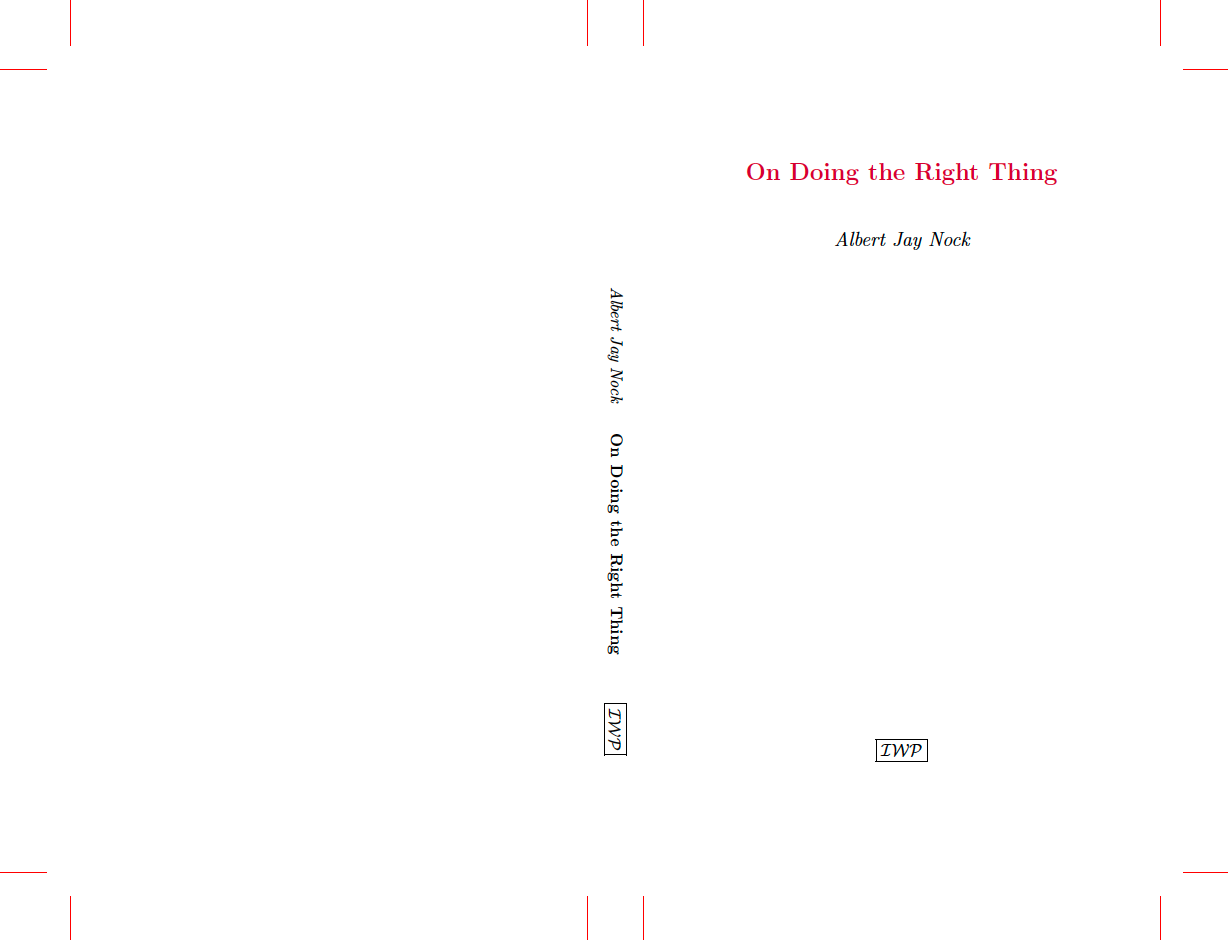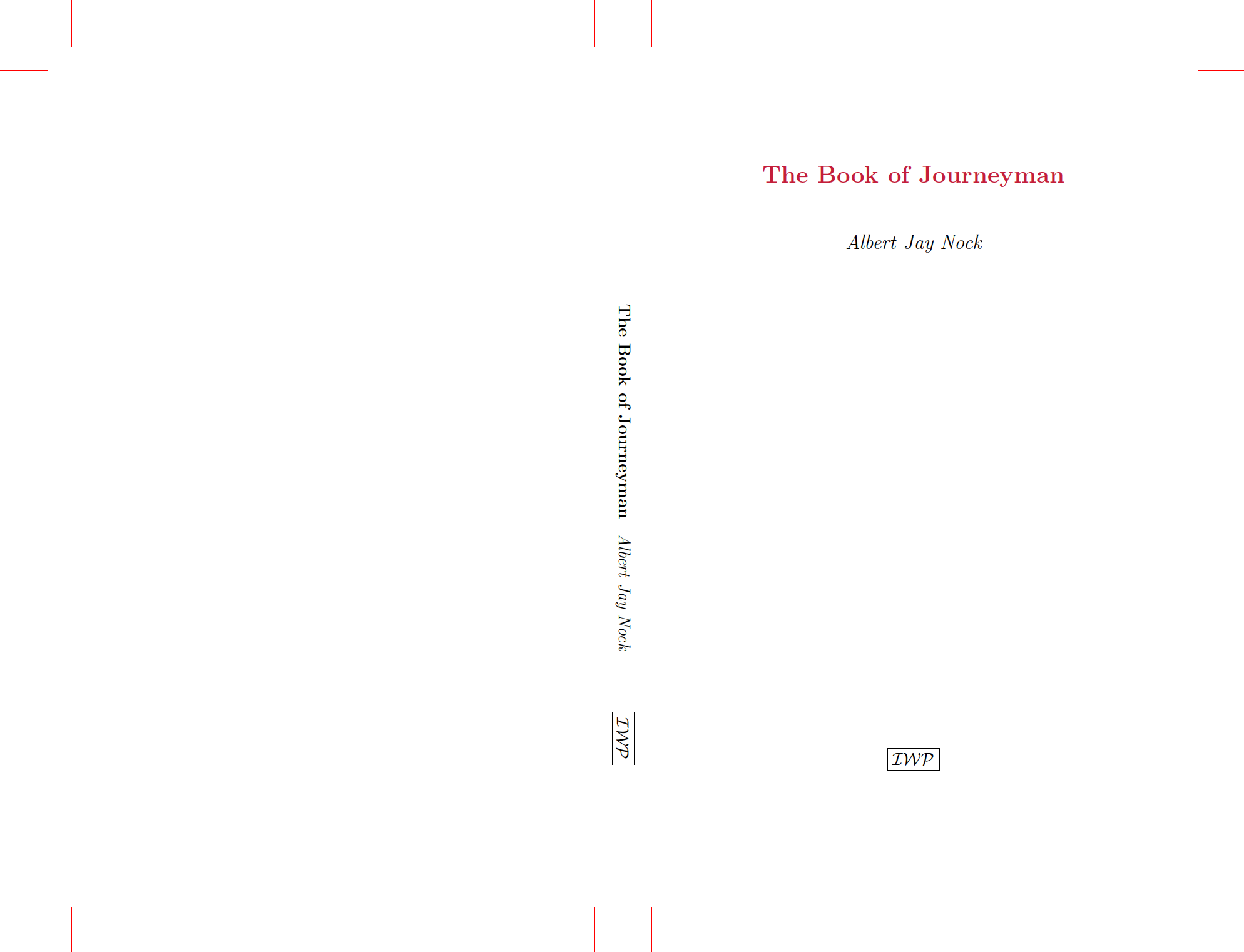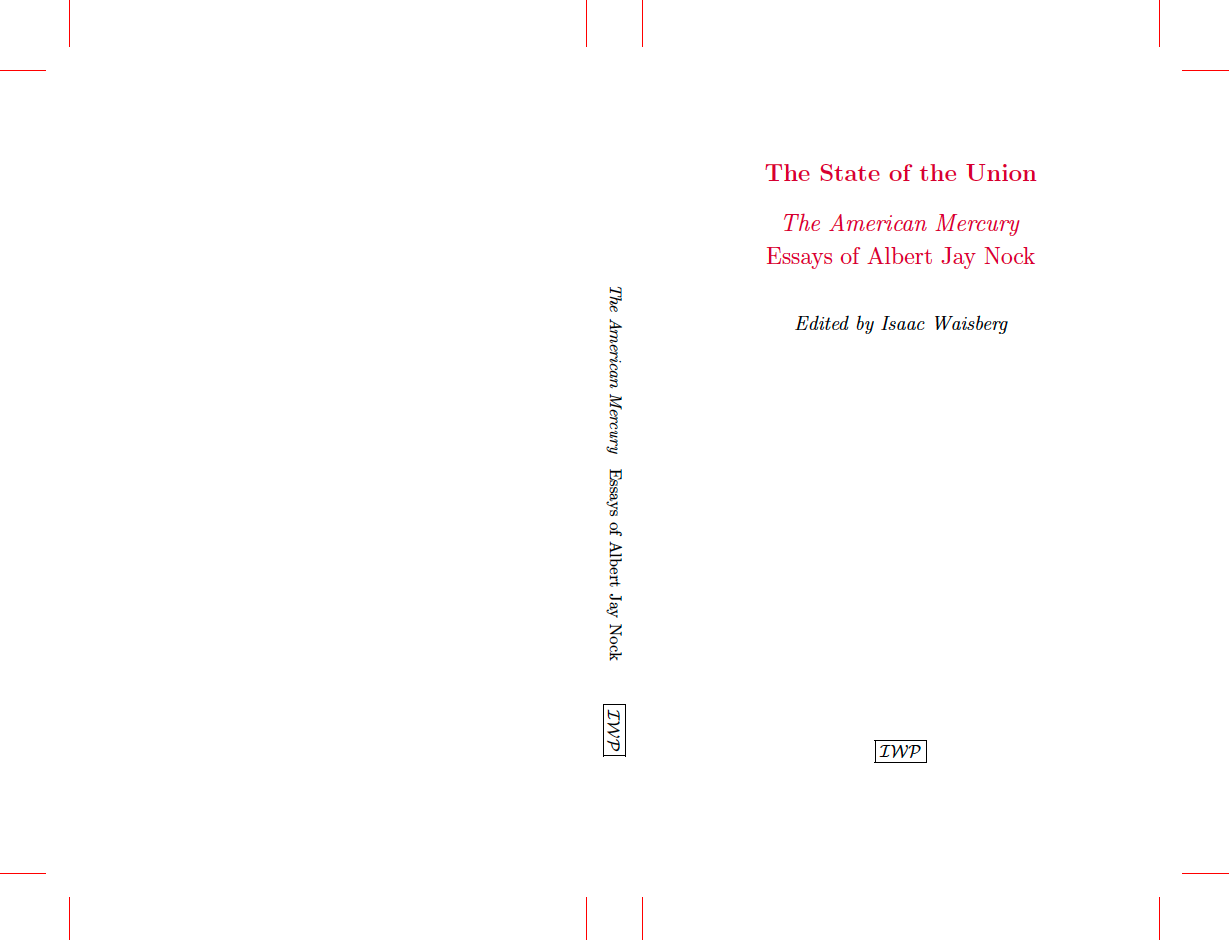“L. P. Jacks: The Art of Living Together. Originally published under the title Constructive Citizenship. The chapters on Skill, Labour, and Leisure should be written in letters of gold on the tables of the heart.” Dorothy L. Sayers, Begin Here: A War-Time Essay
Jacques Barzun on Multiple Choice Tests (The House of Intellect):
They should go. They are an insult to Intelligence, except when played with as parlor games. And something else must go at the same time; I mean the form of such tests. Every man of education ought to take a solemn vow that he will never ‘check’ anything on a printed list. Students should not be asked to pass so-called objective examinations, which are the kind composed of mimeographed questions to be marked Yes or No, or to be solved by matching the right name with a definition. I have kept track for some ten years of the effect of such tests upon the upper half of each class. The best men go down one grade and the next best go up. It is not hard to see why. The second-rate do well in school and in life because of their ability to grasp what is accepted and conventional, the ‘ropes’ of the subject. They become pillars of society and I have no quarrel with them. But first-rate men are rarer and equally indispensable. They see into situations quickly, and with the fresh, clear eye of Intelligence, and they must be encouraged to continue. To them, a ready-made question is an obstacle. It paralyzes thought by cutting off all connections but one. Or else it sets them thinking and doubting whether in that form any possible answers really fits. Their minds have finer adjustments, more imagination, which the test deliberately penalizes as encumbrances. This basic difficulty occurs no matter how carefully the questions are drafted and how extensive their coverage. I sat and worked on a committee that prepared objective questions in history for the so-called Graduate Record Examination, which is now widely used to test college seniors’ readiness for graduate work. In committee, it was revealing to see how a question that seemed ‘foolproof’ and ‘obvious’ to two or three men, thoroughly trained in their field, struck others of the same caliber as ‘ambiguous’ or ‘misleading.’ Add modifiers and you can make the question so unwieldy that it can hardly be grasped at one reading; simplify and you reduce it to bare common fact. Neither extreme, moreover, brings anything out of the student’s mind; yet the power to relate, to think up, to see into, is what distinguishes the first rank from the second in all walks of life. The results of the Graduate examination no doubt correlate very satisfactorily with other indices, but they scarcely give data for the most needful kind of diagnosis. Nor have they ever been tried on the masters of the profession, which would be the test of tests, provided running comments were allowed. When one courageous man proposed just this at an institution that thrives on endless testing, the idea was dismissed as a joke in poor taste.
Tristram Shandy on Writing (Book VIII, Chapter II): “That of all the several ways of beginning a book which are now in practice throughout the known world, I am confident that my own way of doing it is the best. – I’m sure it is the most religious, – for I begin with writing the first sentence, – and trusting the Almighty God for the second.”
Agnes Repplier on Horace:
That a poet should survive two thousand years is not remarkable. Whatever changes two thousand more may bring about, they will not affect the standing of Homer or of Virgil. ‘Ce n’est que le premier pas qui coûte.’ If you survive your first thousand, the others will fall into line. But that a poet writing two thousand years ago should today be the helpmate and spokesman of humanity is in the nature of a miracle. It can be accounted for only by the fact that Horace was a man wholly disillusioned, and wholly good-tempered.
No word in our language has been so misused in the past nineteen years as the word ‘disillusionment.’ It has come to mean the perpetual grouch of men still deeply resentful that the World War was not in the nature of a garden party, and that the World Peace was not a highway to Utopia. Every crime and every folly have been excused on this ground. Even the kaleidoscopic divorces of Reno, the suspension of privacy, the repeal of reticence, have been accounted for by the disillusionment of youth at the way the world was run when it was too young to run it, as the natural result of a war which saw greater acts of heroism and of supreme self-sacrifice than had ever before purified the souls of men.
The disillusionment of Horace was not of this order. It meant that he had awakened from the noble dreams of youth to the equally noble realities of manhood. He saw life as a whole, and this educational process taught him that it is not easy to find happiness in ourselves, and that it is not possible to find it elsewhere. Reason, moderation, content, a wide mental horizon, a firm foundation of principle – these were the gifts of the gods (and Horace reverenced his gods) to men of good purpose and sobriety.
Essay at IWP Articles.
New at IWP Articles: “Horace” (1937) by Agnes Repplier.
New at IWP Books: Our Enemy, The State (1935) by Albert Jay Nock.

Also at JAYS (John Jay Chapman and Albert Jay Nock).
New at IWP Books: On Doing the Right Thing (1928) by Albert Jay Nock.

Also at JAYS (John Jay Chapman and Albert Jay Nock).



Yoshino Cherry, Kew Gardens

Israel, April 2023

“The Super-Milk by Glaxo,” 1920, Welcome Collection, London

New at IWP Books: The Book of Journeyman (1930) by Albert Jay Nock.

From The Book of Journeyman (1930) by Albert Jay Nock:
I have always lived close to the windward side of poverty, sometimes in pretty squalid surroundings, but I thank the Lord that I never had to live in a real-estater’s model suburb. I passed through one the other day, and I must say it was one of the most depressing sights I ever saw. Rows of houses built exactly alike on plots of ground as uncompromising in their uniformity as the squares of a chess-board. The only departure from uniformity was, as you would expect, where it would show most – in the color of the roofs. These were painted in glaring red, blue, purple, green, yellow, but no two adjacent roofs painted the same color.
It struck me then that here was the stock answer to the charge that American life is standardized and mechanized clear out of humanity’s reach. “Do you call us standardized?” These houses would say in indignation, “Just look at our roofs! You can see the signs of our sturdy individualism a mile away.” One wonders whether the interiors of these houses are all alike. Do the same pieces of golden oak furniture, turned out by the same factory, occupy the same relative positions in the same rooms? Moreover, is the life that expresses itself in these straitly limited ways as straitly regularized? Do all hands follow the same routine, internal and external, think the same thoughts, live, move and have their being, spiritual and physical, on the same terms? It is not improbable. Some budding Ph.D. in the social sciences might take for his thesis, “The Real-Estater as a Spiritual Force,” and make quite a good thing of it – good enough to astonish his professors, at least.
New at IWP Books: The State of the Union by Albert Jay Nock.

Rabelais (Gargantua, ch. 27, ed. Pléiade):
En l’abbaye estoit pour lors un moine claustrier nommé frere Jean des entommeures, jeune gallant: frisque : de hayt : bien à dextre, hardy : adventureux, deliberé : hault, maigre, bien fendu de guele, bien advantagé en nez, beau despacheur d’heures, beau desbrideur de messes, vray croteur de vigiles, pour tout dire sommairement, vray moyne si oncques en feut depuys que le monde moynant moyna de moynerie.
Sir Thomas Urquhart (1653):
There was then in the abbey a claustral monk called Friar John of the Funnels, young, gallant, frisk, lusty, nimble, quick, active, bold, adventurous, resolute, tall, lean, wide-mouthed, long-nosed, a rare mumbler of matins, unbridler of masses, and runner-over of vigils; and to conclude summarily, in a word, a right monk, if ever there were any, since the monking world monked a monkery.
W. F. Smith (1893):
In the abbey at that time was a cloistered monk named Friar John of the Trencherites, young, gallant, frisky, lusty, very handy, bold, adventurous, resolute, tall, lean, with a rare gaping mouth and a mighty prominent nose, a fine mumbler of matins, unbridler of masses, and a scourer of vigils; to say everything summarily, a very monk, if ever there was one, since the monking world monked a monkery.
Samuel Putnam (1946):
In the abbey, there happened to be at this time a cloistered monk by the name of Friar John Hackem, young, gallant, spruce, good-natured, quite handy, bold, adventurous, level-headed, tall, lean, with a good chin and plenty of nose, a fine dispatcher of prayers and masses, an expert blinker of vigils – in short, a true monk, if ever there was one since this monking world of ours first monked a monkery.
J. C. Powys (1948):
But there chanced to be at that very crisis in this fortunate Abbey a cloistered monk called Friar John of the First Cut, or, if you prefer, of the Meat-Choppers, a monk who was young, gallant, lively, bold, adventurous, sturdy, tall and lean; a monk who had a big mouth and huge nose, a monk who was a mighty despatcher of canonical hours, a glorious rusher-through of masses and rattler-off of prayers, and indeed to sum it all up, as true and veritable a monk as there has ever been upon earth since a monking world first monked its monkeries.
J. M. Cohen (1955):
There was in the abbey at that time a cloister monk, named Friar John of the Hashes, a young, gallant, sprightly, jovial, resourceful, bold, adventurous, resolute, tall, and thin fellow with a great gaping mouth and a fine outstanding nose. He was grand mumbler of matins, dispatcher of masses, and polisher of vigils, and, to put it briefly, a true monk if ever there has been one since the monking world monked its first monkery…
Burton Raffel (1990):
Now, at that time there resided in the abbey a cloistered monk, Brother John Mincemeat – young, strong, lively, always in a fine humor, good with his hands, bold, adventurous, thoughtful, tall, lean, noisy, with a handsome nose, who knew the breviary inside out and could read it like a flash (and could say a mass, too, without wasting any time), who got through vigils in the twinkling of an eye – in short, a true monk if ever there monked one since the days when monks first practiced monking through this unmonkish world of ours…
Donald Frame (1991):
In the abbey at the time there was a claustral monk named Frere Jean des Entommeures (Friar John of the Hashes), young, gallant, frisky, cheerful, very deft, bold, adventurous, resolute, tall, thin, with a wide open throat, well fixed for a nose, a great dispatcher of hours, a great unbridler of masses, a fine polisher-off of vigils, to sum it all up briefly a real monk if ever there was one since the monking world first monked in monkery…
M. A. Screech (2006):
There was at this time in that abbey a cloistered monk called Frere Jean des Entommeures, young, gallant, lively, lusty, adroit, bold, daring, resolute, tall, slim, loud-mouthed, endowed with an ample nose, a galloper through of matins, an unbridler of masses (and a polisher-off of vigils): in short, a trued monk if ever there was one since the (monking) world first monked-about (with monkery…)
Jacques Barzun (From Dawn to Decadence) on Rabelais:
His great work is in five ‘books’ and the authenticity of the fifth has been questioned because it was published posthumously. That any forger could have imitated style and thought and carried out the indicated scheme as perfectly as we find it done is not credible. Writing is not like painting, an art in which mechanical skill can deceive. Of all the translations of Rabelais into English, the first, by Urqhart and Motteux, should be at least browsed in. It is not altogether faithful, but it is the only one that re-creates the atmosphere of verbal exuberance.
“…among the two trios of thinkers whom Barzun was always to acknowledge as mentors – Montaigne, Rabelais, Pascal, ‘with Nietzsche and Ortega in tow,’ and Shaw, Whitehead, and James – only James did Barzun call ‘my master.’”Michael Murray, Jacques Barzun: Portrait of a Mind.
George Orwell’s 1940 Review of Mein Kampf.
“The book to read is A Journey Into Rabelais' France by Albert Jay Nock; but note that the author’s naming one of Rabelais' characters John of the Funnels is a mistake. The name Jean des Entommeurs is not des Entonnoirs: substitute John the Hacker.” Jacques Barzun, From Dawn to Decadence
Sir Thomas Urquhart (1653): John of the Funnels
Samuel Putnam (1946): John Hackem
J. C. Powys (1948): John of the First Cut
J. M. Cohen (1955): John of the Hashes
Burton Raffel (1990): John Mincemeat
Donald Frame (1991): John of the Hashes
Jacques Barzun (2000): John the Hacker
M. A. Screech (2006): Jean des Entommeures
From Jacques Barzun, From Dawn to Decadence:
Ortega y Gasset died at mid-century, but in his treatment of the arts, education, psychology, and social theory, this aptest observer of his period delineated the leading features of the next. That he was not much cited or quoted after his death does not amount to a settled judgment upon him… Sooner or later he will have to be heard as a witness – and not alone. To know the whole century adequately, historians will have to listen to the words of several others who also belong to its formative time. To cite only three Americans: John Jay Chapman, Albert Jay Nock, and Leo Stein.
“‘Real progress,’ in the words of Dr. R. R. Marett, ‘is progress in charity, all other advances being secondary thereto.’” Aldous Huxley, Ends and Means
From “The Triumph of the Gadget” (1939) by Albert Jay Nock:
During the last fifty years there has been invented almost every conceivable labor-saving device, with the consequence that the average man is in a state of utter manual incompetence. This is well-known and is often commented upon. But what is not so often observed is that these gadgets are not only labor-saving but brain-saving, thought-saving; and it seems an inescapable conclusion that a correlative mental incompetence is being induced.
A certain amount of resistance seems necessary for the proper functioning of mental and moral attributes, as it is for that of physical attributes. In any of these three departments of life, if you can get results without effort, and habitually do so, the capacity for making the effort dwindles. Whatever takes away the opportunity for effort, whatever obviates or reduces the need for making it, is therefore to some degree deleterious. It needs a bit of brains to manage a furnace-fire successfully; an automatic heater needs none; hence many householders today could not manage a furnace-fire to save their lives. It needs some brainwork to add up a column of figures; running an adding-machine needs nothing but attention; consequently there are many book-keepers and bank-clerks now who not only do not add but cannot. As we all have frequently had occasion to observe, shopkeeping now seldom requires any more strenuous mental exercise than is involved in consulting a price-list. Cooking is a great art, requiring a lot of brain-work; running the modern kitchen requires far less.
Animals having organs which, on account of changes in their environment, they no longer use, turn into a species which has only vestigial remnants or rudimentary forms of these organs, sometimes amounting to no more than mere vague suggestions, like the os coccygis in human beings, which vaguely suggests a remote ancestral tail. There is much in “the course of modern civilization” which strongly intimates that this may be happening to the mental and moral powers of Western man. The trouble with arm-chair-and-push-button Utopias like the one so attractively sketched for us by H. G. Wells, is that they carry brain-saving to the point of complete disuse. Even at present, judging by what one sees, hears, and reads, great numbers of Americans seem pretty well to have reached that point already.
Americans are the world’s foremost gadget-users, and unquestionably the leisure gained in this way is used chiefly for further brain-saving – a substitution of play-gadgets for work-gadgets; motion-pictures, automobiles, radio-music, as an alternative to adding-machines, price-lists, fireless cookers. One could make out a very reasonable case for the statement that Americans at large have given up using their brains for purposes of thought, and use them only for purposes of attention and contemplation. If this be so, then with the field of gadgetry steadily enlarging and brain-power proportionately dwindling, one might plausibly forecast a generation of American children born without any brains at all, but only with vestigial faculties of attention and contemplation, no more highly differentiated – perhaps even less highly – than those which are common to extremely low forms of animal life.
See Things as They Are by Alert Jay Nock at IWP Books
From “The Amazing Liberal Mind” (1938) by Albert Jay Nock:
A Liberal is dangerous for the same reason Amiel thought women are dangerous. A woman, Amiel says, is “sometimes fugitive, irrational, indeterminable, illogical and contradictory. A great deal of forbearance ought to be shown her, and a good deal of prudence exercised towards her, for she may bring about innumerable evils without knowing it.” This may or may not be a true bill against women – I am not entitled to an opinion about that – but I have observed Liberals closely for many years with ever-increasing wonder and amazement, and I am prepared to say that Amiel’s sentence fits them like a poultice.
See Things as They Are by Albert Jay Nock at IWP Books.